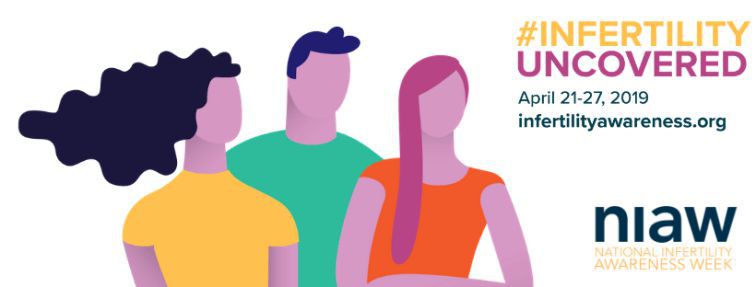In recent years, the focus of National Infertility Awareness Week (NIAW) has been to change the conversation surrounding infertility – to address the misconceptions, stigma and silence that accompany the medical diagnosis of infertility.
National Infertility Awareness Week April 21-27, 2019 is recognized by health organizations, clinics and doctors across the country each April. NIAW began as a movement in 1989, with the goal to raise awareness about the disease of infertility, an often difficult topic for people to discuss, and encourage men and women to understand their reproductive health. In 2010 National Infertility Awareness Week was declared a federally recognized health observance by the Department of Health and Human Services.
Get the facts on infertility beyond National Infertility Awareness Week
Infertility is defined as the inability to conceive or carry a pregnancy to term after 12 months of trying. If you are over the age of 35, you should see a doctor after trying to conceive for six months.
Infertility is quite common. In fact, it’s estimated that 1 in 8 couples will experience infertility in their lifetime. Infertility is often considered to be a women’s health issue, but it affects men and women equally. According to the American Society for Reproductive Medicine (ASRM) approximately one-third of infertility is attributed to the female partner, one-third attributed to the male partner and one-third is caused by a combination of problems in both partners.
Conception is a complicated process that depends on a number of factors including the woman’s age, overall health and well-being of both partners, and the proper function of the reproductive systems of the man and woman. When it comes to infertility, it’s important to remember the following facts.
- Infertility is NOT an inconvenience; it is a disease of the reproductive system that impairs the body’s ability to perform the basic function of reproduction.
- No one is to blame for infertility. Infertility is a treatable medical condition that can occur for a variety of reasons.
- Infertility affects 10-15 percent of couples, making it one of the most common diseases for people between the ages of 20 and 45.
- Twenty-five percent of infertile couples have more than one factor that contributes to their infertility.
- In approximately 50-60 percent of infertile couples, the male partner is either the sole cause or a contributing cause of infertility.
- Irregular or abnormal ovulation accounts for approximately 25 percent of all female infertility problems.
- It is possible for women with body weight problems to reverse their infertility by attaining and maintaining a healthy weight. For overweight women, just losing 10 percent of your weight can make a big difference.
- Men and women who smoke have decreased fertility.
We understand that a lot of shame and fear are associated with infertility. Our goal is to provide an open environment where couples feel comfortable and can overcome the stigma of an infertility diagnosis. National Infertility Awareness Week reminds us how far we’ve come and just how far we have yet to go before infertility is understood as a medical condition, not a personal failure to be ashamed of.
Resources for any time of the year
A key component of raising awareness is education, and not just during National Infertility Awareness Week. Many resources are available to individuals and couples looking to learn more about infertility in general, conditions that may cause infertility, potential treatment options, as well as emotional and psychological support for couples experiencing infertility. In addition to the wealth of information we have on our website about all these issues, some of our favorite resources are listed below.
The American Society for Reproductive Medicine (ASRM)
Provides multidisciplinary information, education, advocacy and medical standards in the field of reproductive medicine.
RESOLVE: The National Infertility Association
Aims to support, educate and advocate for the needs of individuals and couples experiencing infertility.
National Infertility Awareness Week comes along every year. We encourage you to look for ways to engage!






